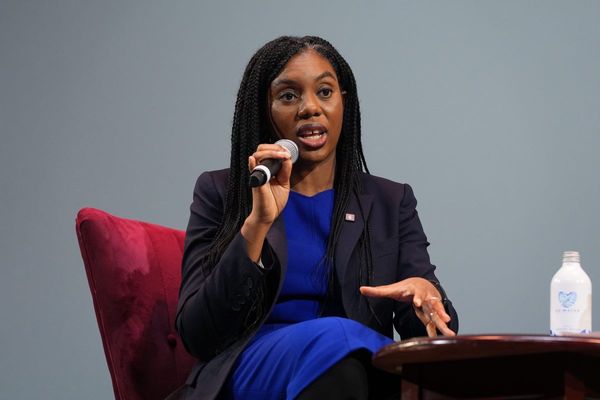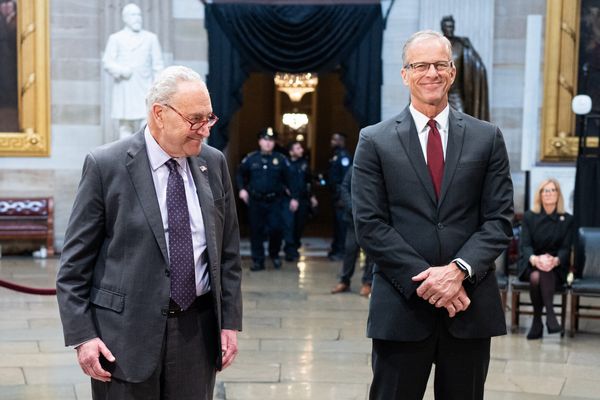
Question of the Week
The Oscars were this week, so let’s talk about cinema. What’s a film, or a performance in a film, that taught you something, or changed your life in some significant way, or that you simply love?
Alternatively, make your case for the most underrated movie of all time. Or, if you prefer, make a case to Hollywood for the film you most want them to make. I’m here for all your movie takes.
Conversations of Note
As the war in Ukraine grinds on, President Joe Biden made headlines with a speech in Warsaw in which, departing from his scripted remarks, he declared, “For God’s sake,” Russian President Vladimir Putin “cannot remain in power.” The White House quickly clarified that he wasn’t calling for regime change. Biden later said that he was expressing the moral outrage he feels.
Fred Kaplan argues that the gaffe could make the war in Ukraine harder to end:
If Putin ever feels compelled to seek a negotiated settlement to the war, he may restrain that impulse—he may be slower to act on it—if he thinks the war is about his own hold on power and that, if he stops fighting, his foes will move rapidly to chop off his head.
Henry Olsen makes the case that Biden’s words were not a forgivable mistake but part of a frightening pattern:
In January, he implied a “minor incursion” by Russia into Ukraine might not trigger Western sanctions. More recently, he appeared to surprise his own administration by labeling Putin a “war criminal.” He also told members of the U.S. 82nd Airborne Division in Poland that they would witness the bravery of Ukrainians “when you’re there,” seeming to imply that U.S. troops would enter the fighting. He also said NATO would respond “in kind” if Russia used weapons of mass destruction in its war with Ukraine, appearing to suggest that the alliance would use tactical nuclear or chemical weapons in response if Putin did so first …
The world looks to the U.S. president to provide global leadership. That person must demonstrate calm and prudence while making decisions, knowing that every word will be scrutinized to ascertain U.S. policies. Biden’s consistent inability to perform this task means that aides must constantly “clean up” his remarks and clarify U.S. policy after the fact.
Jonathan Last grants that Biden shouldn’t have publicly declared that Putin can’t stay in power, but insists that Biden’s overall performance remains solid. Among the evidence he cites:
- The NATO/EU alliance against Russia remains solid and unified.
- Sanctions on Russia are crushing its economy and inflicting tremendous pain on the country.
- The combined response has made the Chinese wary of holding hands too tightly with Putin and created the beginnings of a wedge between the two countries.
- The military-aid pipeline has functioned well and given Ukrainians effective weaponry.
- The real-time intelligence pipeline from NATO to Ukraine is functioning well enough that Russian generals keep getting popped.
- Russian losses are staggering—far above what anyone predicted going into the conflict.
- Ukraine has held all major cities and even begun counteroffensives west of Kyiv.
Last concludes that “it is hard to see how Ukraine or the West could be in a better position than they are right now.”
Meanwhile, Glenn Greenwald believes that the West is in a perilous position, due to “the grave dangers of the world’s two largest nuclear-armed powers acting on opposite sides of a hot war” and an American president “too age-addled to speak clearly or predictably.”
Greenwald writes:
The U.S. and Russia are now in waters uncharted since the Cuban missile crisis. Even the savage US/USSR proxy wars of the 1980s in Latin America and Afghanistan did not entail these sorts of rapidly escalating threats. A Russian president who, validly or not, feels threatened by NATO expansion in the region and driven by questions of his legacy, on the other side of a U.S. president with a long record of hawkishness and war fever which is now hobbled by the carelessness and infirmities of old age, is a remarkably volatile combination …
Hovering above all of these grave dangers is the question of why? What interests does the U.S. have in Ukraine that are sufficiently vital or substantial to justify trifling with risks of this magnitude?
Here is how Anne Applebaum contextualizes the importance of the Ukraine conflict:
The American security guarantee that underlies the stability of Europe and North America is more uncertain than it has ever been. America’s own democracy, which served as a role model for so many others, is challenged as it has not been in decades, including by those who no longer accept the results of American elections. At the same time, the world’s autocracies have now accumulated enough wealth and influence to challenge the liberal democracies … The leaders of China, Russia, Iran, Belarus, and Cuba often work together, supporting one another, drawing on kleptocratic resources—money, property, business influence—at a level Hitler or Stalin could never have imagined. Russia has defied the entire postwar European order by invading Ukraine.
A Case for Epistemic Modesty
Nicholas Tampio reaches back to antiquity to highlight it at Aeon:
Say that you identify yourself in the school of thought associated with a preeminent person, for example Sir Isaac Newton or Albert Einstein. If you were alive before they were born, then you would not have known that your thinking would have changed upon reading, say, Newton’s Principia (1687) or Einstein’s articles of 1905. “In like manner,” Sextus writes, “it is possible, as far as nature is concerned, that an argument antithetical to the one now set forth by you is in existence, though as yet unknown to us.” Another scientific revolution may be around the corner. Somebody in the past or alive right now might have an argument that would weaken a belief that you take for granted.
A Bleak Literary Landscape
Kat Rosenfield laments that “the right and left appear to be engaged in a frantic race to the bottom when it comes to freedom of expression.” You’re probably familiar with the right’s tactics, pulling certain books that offend conservative sensibilities from curriculums and school libraries.
As for the latest in censoriousness on the left, Rosenfield writes that the most alarming actions often take place before a book is published, within the left-leaning world of publishing itself:
Unlike traditional book banning, which targets already-published work, this is a literary McCarthyism that flies largely under the radar; for every author who writes candidly about the deleterious effect of identitarian politics on their work, there are dozens who bristle at the interference but stay silent for the sake of their livelihoods. Ultimately, it’s more chilling than anything the right could cook up. Left-wing censorship stifles creativity at the source, intimidates writers with the threat of social and professional death if they refuse to toe the line, and, crucially, obviates the entire notion of suppressing books post-publishing. After all, one need not bother banning what never existed in the first place.
It’s also a feature of these practices that those who engage in them will categorically deny that what they’re doing is censorship. When they say a book shouldn’t exist, that’s just criticism; when a terrified author capitulates to their demands, she just did the right thing. We are often reminded in these conversations that a book deal is a privilege, not a right—and that these problematic authors are taking up space that might have gone to someone more deserving.
The subtext is a profound shift in the idea of what it means to “deserve” a career as a writer, as if book deals are a reward for good moral character rather than compensation for quality work.
Two Elites Vying for Power
That’s what Damon Linker sees after pondering the conspiratorial texts that Ginni Thomas, the wife of Supreme Court Justice Clarence Thomas, sent in the aftermath of the 2020 election:
The real political fault line today isn’t between a progressive-liberal elite establishment and those over whom it rules, who are increasingly willing and eager to challenge and deny its legitimacy. The real political fault line is between competing establishments and elites—one on the left, the other on the right. Tucker Carlson might spend his evenings leading what sounds like class warfare against an entrenched progressive establishment of left-wingers, but he’s a television star watched by millions who makes a small fortune in his job. He’s as much a member of America’s cultural and political elite as anyone.
The same goes for the Republican leadership in Congress and Supreme Court justices appointed by Republican presidents—and also for their spouses, especially when they take part in politics on the highest levels, as Ginni Thomas has chosen to do. It might make political sense for Republican politicians to pretend they’re engaging in class warfare on behalf of the downtrodden. But in reality, they’re one set of elites waging a battle against another set of elites by LARPing as class warriors. It’s a shtick. That doesn’t mean Thomas is faking her belief in QAnon-adjacent conspiracies about the 2020 election. But it does mean that affirming those beliefs does nothing to demonstrate she’s doing battle against the establishment. She is the establishment. Or at least one of them.
The Slap
New York rounded up almost all of the takes––including this from The Atlantic’s Sophie Gilbert––though not an old gem from the late playwright William Shakespeare, which might be worth revisiting:
All the world’s a stage,
And all the men and women merely players;
They have their exits and their entrances,
And one man in his time plays many parts,
His acts being seven ages. At first the infant,
Mewling and puking in the nurse’s arms.
Then, the whining school-boy with his satchel
And shining morning face, creeping like snail
Unwillingly to school. And then the lover,
Sighing like furnace, with a woeful ballad
Made to his mistress’ eyebrow. Then, a soldier,
Full of strange oaths, and bearded like the pard,
Jealous in honour, sudden, and quick in quarrel,
Seeking the bubble reputation
Even in the cannon’s mouth …
Is this the fourth age of Will Smith?
Provocation of the Week
“In the spring of 2022, speculation in the commentariat that partisan rivalries were bringing the United States to the verge of actual civil war abruptly came to an end. With few exceptions, Americans of left, right, and center rallied around the national colors. Postmodern multiculturalism and anti-Enlightenment paleoconservatism suddenly were marginalized by romantic nationalism of the 19th-century variety. As war fever swept America, progressives and conservatives joined in denouncing not only the enemy government but also the enemy people and their enemy music, enemy literature, and enemy cuisine. Americans displayed the national flag in every imaginable form and pledged undying hatred of the nation’s foes.
The nation that Americans celebrated was not their own, but rather Ukraine, following the brutal Russian invasion of the former Soviet republic.” ––Michael Lind, writing in the magazine Tablet.
Thanks for your contributions. I read every one that you send. By submitting an email, you’ve agreed to let us use it—in part or in full—in the newsletter and on our website. Published feedback may include a writer’s full name, city, and state, unless otherwise requested in your initial note.







